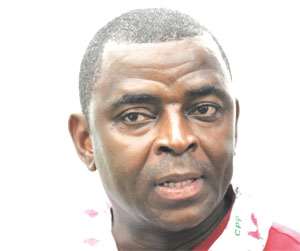
The Convention People's Party (CPP) has described the year 2014 as testifying to the country's darkest days.
'The year 2014 would go down in the annals of Ghana's history as one of the most vicious phases of the impoverishment of the people of Ghana since independence in 1957,' it stated.
In a statement signed by the party's Director of Communication, Nii Armah Akomfrah, it observed that rise in electricity tariff, which began in 2013, had seen a net of 65 per cent increase within four months, water had seen 7 per cent, fuel had seen 13 per cent and VAT 2.5 per cent, all cumulatively impacting on transportation cost by as much as 50 per cent.
Unsurprisingly, the party said inflation was at 13.5 per cent and still rising.
In the view of the party, the depreciation of the country's currency brings its own woes.
According to the CPP, many accept that the party's stance that the Ghanaian economy should not rely on fiscal austerity and inflation-targeting, shared by the Trades Union Congress (TUC), is in order.
It said employment creation should be the country's foremost growth and development strategy.
The statement further noted that Ghana's trade liberalisation policy had restrained the growth of the manufacturing and agricultural sectors and was the major cause of unemployment in the economy.
The statement described it as 'a policy that makes Ghanaians dependent on imports' and 'it is largely the cause of our trade deficit and pressure on the value of our currency and exchange rate.'
According to the statement, the CPP believes that the current situation bears traits of February 24,1966 as the darkest day of infamy in the fifty-seven years of Ghana's independence.
'It was on that date that a section of Ghana's military, in collaboration with foreign co-conspirators, violently overthrew the constitutional government of the Convention People's Party (CPP) led by Dr Kwame Nkrumah,' the statement added.
The CPP pointed out that the military treason derailed the development course charted by the CPP for Ghana's development; saying, 'It dismantled the foundation for accelerated growth and development initiated by the CPP government and destroyed the educational program based on a policy of Fee-free Compulsory Education,' as well as the CPP government's comprehensive healthcare system.
What the country is facing today, according to the CPP, is proof that successive governments of Ghana have supervised the destruction of manufacturing plants sited at strategic locations around Ghana by the CPP government.
It said the National Liberation Council (NLC), the military-cum-police-dictatorship that overthrew the constitutional CPP government, orchestrated deliberate destruction of the political image of Kwame Nkrumah and the work done by the CPP government.
The CPP further said one of the first acts of the NLC military dictatorship was to ban the existence of the CPP as an organisation, including its branches, limbs and leaves.
The NLC, the CPP said, also banned the Ghana Young Pioneer Movement that took children off the streets and imbued into them principles of patriotism and service to humanity. It dismantled also the Ghana Workers Brigade, an organisation that was on the road to becoming a self-sufficient institution that would have provided jobs for young men and women who served society in a disciplined fashion.
Governments, since 1966, according to the CPP, have accepted a consensus that champions the private foreign sector of Ghana's economy, subjecting all other sectors to such foreign private interests.
As a result, the CPP said instead of wealth for all, including local Ghanaian entrepreneurs, they had produced poverty, insecurity and dangerous division in our society.
'They have produced corruption, intolerance and repression within the state institutions that administer our society,' it concluded.




 Beige-bank trial: Beige Bank disobeyed BoG — Prosecution
Beige-bank trial: Beige Bank disobeyed BoG — Prosecution
 NACOC staff arrested over cocaine smuggling
NACOC staff arrested over cocaine smuggling
 Controller and Accountant General resigns
Controller and Accountant General resigns
 Election 2024: Mute voices of politicians with 'sharp tongue' — Security Expert ...
Election 2024: Mute voices of politicians with 'sharp tongue' — Security Expert ...
 NDC opts out of Ejisu by-election
NDC opts out of Ejisu by-election
 Recommissioning of Ameri Power Plant an indication of clueless govt – NDC
Recommissioning of Ameri Power Plant an indication of clueless govt – NDC
 Love text message exposes pedophile
Love text message exposes pedophile
 Palm wine tapper kills wife over infidelity at Bogoso
Palm wine tapper kills wife over infidelity at Bogoso
 Dome Kwabenya: Mike Ocquaye washes woman panties for votes
Dome Kwabenya: Mike Ocquaye washes woman panties for votes
 MASLOC former boss sentenced to 10 years in prison with hard labour
MASLOC former boss sentenced to 10 years in prison with hard labour
